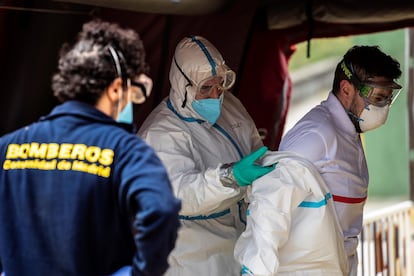Daily coronavirus fatalities rise once more in Spain after three days below 200
Madrid premier Isabel Díaz Ayuso says that the region is not yet ready to move to the next confinement deescalation phase

Spanish health authorities announced on Wednesday that overnight coronavirus-related fatalities had come in at 244, a rise from the 185 recorded on Tuesday.
This new figure breaks a three-day run of fewer than 200 daily deaths, and brings total fatalities since the beginning of the pandemic to 25,857, according to the official count. The number of infections since the epidemic began, as measured by the more reliable PCR testing, stands at 220,325, a rise of 0.31% of the total. For the past week, the daily percentage rise of new cases has remained below 1% of the total.
Madrid and Catalonia continue to be the Spanish regions worst affected by the pandemic. The two areas reported half of daily coronavirus deaths (121 of 244) and half of all cases (114,340 of 220,325), although the latter figure could change, given that Madrid is continuing to make adjustments to its data. The regions also represent half or more of the total number of hospital and intensive care admissions. Meanwhile, the Canary Islands reported no new coronavirus cases on Wednesday, and 11 regions recorded fewer than two intensive care admissions.
In the past 24 hours, 2,516 coronavirus patients have recovered from the disease, bringing the total number of discharged patients to 126,002. The daily rise in hospitalizations and intensive care admissions is 0.7% and 0.46% of the total, respectively.
Speaking at the government’s daily press conference, Fernando Simón, the director of the Health Ministry’s Coordination Center for Health Alerts and Emergencies, said “the trend is falling,” and attributed the rise in daily deaths to the oscillations typical in the evolution of outbreak curves.
With respect to infections among children, the rise in daily cases remains around 1%, meaning this rate has not significantly risen since April 26, when minors under the age of 14 were allowed to go outside for a daily walk. The average rise in daily cases from the past four days is 1.16%, compared to 1.8% from the same four-day period last week.
The latest figures come as Prime Minister Pedro Sánchez appeared in Congress on Wednesday to request an extension of the state of alarm, which has been in place since March 14 when confinement measures were first implemented. This measure gives the government emergency powers that underpin its plan to combat the spread of the coronavirus.
Situation in Madrid
Madrid’s regional premier, Isabel Díaz Ayuso of the Popular Party (PP), said that the region is not ready to enter Phase 1 of the gradual deescalation plan recently announced by the government.
In an interview on the state radio station RNE, Díaz Ayuso said that the number of critical care patients in the region, 640, suggests Madrid should remain for now in Phase 0, which places greater restrictions on citizen mobility.
Her views are not shared by her own deputy, Ignacio Aguado, who said the region is ready to move on and should reopen so the economy is not further damaged.
Meanwhile, an internal document from the Madrid health department has revealed that the 100,000 rapid coronavirus tests that regional authorities purchased to test its healthcare workers are not nearly as reliable as the Madrid government had claimed.
The number of health workers who have contracted the coronavirus has risen 39% in the past two weeks, according to figures released on Monday by the Spanish Health Ministry. A total of 43,325 health workers have now been infected since the beginning of the outbreak. What’s more, the figures show that these professionals make up more than half of new coronavirus cases in Spain.
Impact on tourism
Spain welcomed a little over two million foreign tourists in March, a 64.3% drop from the same period last year, according to new figures released by the National Statistics Institute (INE). And the tourists who did come spent 63% less, for a collective €2.2 billion. The coronavirus pandemic, which led to a lockdown in the middle of March, effectively shut down national borders and delivered the biggest blow on record to the tourism industry.
New rules for symptoms
From now on, health professionals will not only consider coughing, fever and breathing difficulty as signs of coronavirus. Other atypical symptoms such as painful swallowing, loss of smell, diarrhea and taste alterations will also be considered symptoms of Covid-19 infection, according to a document drafted by the Health Ministry in partnership with regional authorities on Monday. According to this text, a doctor who sees a patient with these symptoms may request a PCR test.
English version by Susana Urra.







































